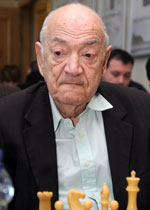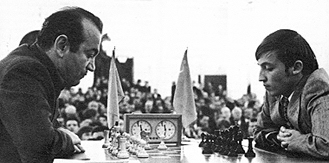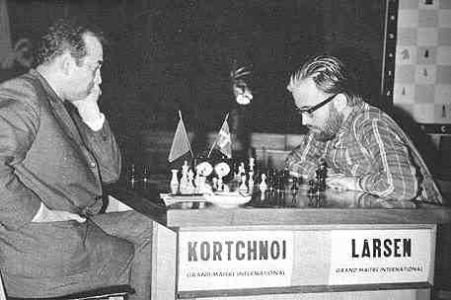Korchnoi Victor Lvovich (23.03.1931-06.06.2016)
 Viktor Lvovich Korchnoi was a Swiss Grandmaster (title granted in 1956 at the age of 25) who was born in Russia. He was World Senior Champion in 2006 and one of the world top chess players between 1960 and 1990.
Viktor Lvovich Korchnoi was a Swiss Grandmaster (title granted in 1956 at the age of 25) who was born in Russia. He was World Senior Champion in 2006 and one of the world top chess players between 1960 and 1990.
Korchnoi began to play chess at the age of six and he survived during the blockade of Leningrad in 1941-1943. After getting the Soviet master title in 1951 he began to play chess professionally, however, chess did not prevent him from graduating from the Leningrad University faculty of History.
Korchnoi showed excellent results by winning strong tournaments in Bucharest 1954, Hastings 1955-1956 (equal with Fridrik Ólafsson), Krakow 1959, Budapest 1961, Yerevan 1965, Gyula 1965, Budva 1967 (ahead of Mikhail Tal), Leningrad 1967, Wijk aan Zee 1968 (ahead of Mikhail Tal), Palma de Majorca 1968 and in Sarajevo, 1969. He participated in National chess events and won the Leningrad Championship 1955, 1957 and 1964. In the period 1952-1973 he played in 16 USSR Championships and won four times in 1960, 1962, 1964-5 and 1970. During the WC cycle 1962-1964 he shared fourth place at the Stockholm Interzonal which gave him the right to compete in the Candidates tournament later that year, in which he finish fifth. During the WC cycle 1967-1969 he finished equal second at the Sousse Interzonal, then beat Samuel Reshevsky in the quarter final (+3=5), won the semi-final match against Mikhail Tal (+2=7-1), but was defeated by Boris Spassky (3½:6½) in Kiev the following year. During the WC cycle 1970-1972 in the first stage of the Candidates matches Korchnoi beat Efim Geller (+4=3-1), but lost to Tigran Petrosian in the next stage.
During the WC cycle 1962-1964 he shared fourth place at the Stockholm Interzonal which gave him the right to compete in the Candidates tournament later that year, in which he finish fifth. During the WC cycle 1967-1969 he finished equal second at the Sousse Interzonal, then beat Samuel Reshevsky in the quarter final (+3=5), won the semi-final match against Mikhail Tal (+2=7-1), but was defeated by Boris Spassky (3½:6½) in Kiev the following year. During the WC cycle 1970-1972 in the first stage of the Candidates matches Korchnoi beat Efim Geller (+4=3-1), but lost to Tigran Petrosian in the next stage. 
During the WC cycle 1973-1975 he came equal first with Anatoly Karpov at the Leningrad Interzonal, beat Henrique Mecking (+3=9-1) then Tigran Petrosian (+3=1-1). In 1974, for the challenger’s nomination to Fischer, he was beaten in Moscow by Anatoly Karpov with the score 11½:12½. Korchnoi left Russia in 1976 because his chess career was in danger and according to the Soviet Authorities he was anti-social and far too marginal. He first moved to the Netherlands, where in 1977 he won the national championship, and soon after he settled in Switzerland and won the national title in 1982, 1984 and 1985. He also played in the Candidates matches of 1977 and beat Petrosian +2=9-1, Lev Polugaevsky +5=7-1 and Spassky +7=7-4. He finally earned the right for the title match in 1978, which he lost to Karpov +5=21-6 in Baguio. Korchnoi played successfully in strong tournaments and was the first or equal first in South Africa 1979, Buenos Aires 1979 with Ljubomir Ljubojevic, Biel 1979, London 1980 with Adolf Andersson and Anthony Miles, Bad Kissingen 1981 and Rome 1981 and 1982. In 1980 he did well in the Candidates matches and convincingly defeated Tigran Petrosian (+3=9-2), Lev Polugaevsky (+3=9-2) and Robert Hubner (+3=3-2). In 1981 he lost the final to Karpov with the score +2-6=10. In the next Candidates cycle of 1983-1984 Korchnoi won the quarter-final match against Lajos Portisch in London (+4=4-1), but lost to Garry Kasparov (4:7).
In the next Candidates cycle of 1983-1984 Korchnoi won the quarter-final match against Lajos Portisch in London (+4=4-1), but lost to Garry Kasparov (4:7).  He continued to take part in international tournaments and won in Wijk aan Zee equal with Beliavsky, in Sarajevo equal with Jan Timman, in Titograd 1984 equal with Dragoljub Velimirovic and in Tilburg 1985 equal with Anthony Miles and Robert Hubner, but he failed at the Montpellier Candidates tournament in 1985. When he was in his fifties, Korchnoi carried on playing in chess events and achieving top results. Some of his best results were: Brussels 1985, 1st; Vienna, 1st with Beliavsky and followed by Karpov, Lubomir Ftacnik, John Nunn and Spassky; Brussels (SWIFT) 1986, 2nd after Karpov; Wijk aan Zee, equal 1st with Nigel Short and Beersheva, equal 1st with Jon Speelman. In 1987 at the Zagreb Interzonal he won the first prize but then in the Candidates match in 1988 he lost to Johann Hjartarson. Korchnoi went on to achieve good results finishing first in Amsterdam 1988 (OHRA) and equal first in Clermont-Ferrand 1989 with Gyula Sax, Sergey Dolmatov, Jaan Ehlvest and Olivier Renet. He also shared second place in Amsterdam 1989 (OHRA) with Speelman, after Beliavsky and in Tilburg behind Kasparov but ahead of Ljubojevic and Sax, he also won the first prize in Beer-Sheva.
He continued to take part in international tournaments and won in Wijk aan Zee equal with Beliavsky, in Sarajevo equal with Jan Timman, in Titograd 1984 equal with Dragoljub Velimirovic and in Tilburg 1985 equal with Anthony Miles and Robert Hubner, but he failed at the Montpellier Candidates tournament in 1985. When he was in his fifties, Korchnoi carried on playing in chess events and achieving top results. Some of his best results were: Brussels 1985, 1st; Vienna, 1st with Beliavsky and followed by Karpov, Lubomir Ftacnik, John Nunn and Spassky; Brussels (SWIFT) 1986, 2nd after Karpov; Wijk aan Zee, equal 1st with Nigel Short and Beersheva, equal 1st with Jon Speelman. In 1987 at the Zagreb Interzonal he won the first prize but then in the Candidates match in 1988 he lost to Johann Hjartarson. Korchnoi went on to achieve good results finishing first in Amsterdam 1988 (OHRA) and equal first in Clermont-Ferrand 1989 with Gyula Sax, Sergey Dolmatov, Jaan Ehlvest and Olivier Renet. He also shared second place in Amsterdam 1989 (OHRA) with Speelman, after Beliavsky and in Tilburg behind Kasparov but ahead of Ljubojevic and Sax, he also won the first prize in Beer-Sheva.
In 1990 Korchnoi took part in the Manila Interzonal tournament and qualified as a Candidate. In 1991 he won a match with Sax with the score +2-1, but was defeated by Timman in Brussels with the score 2½:4½ and that same year he lost a match to Morovic Fernandez in Santiago with the score 2½:3½. He also won several matches, including Nijmegen 1993 against Jeroen Piket 6:2, China 1995 against Xie Jun 3:1, Mexico 1996 against Gilberto Hernandez 5½:2½, in Albert 1997 against Etienne Bacrot 4:2 and in St. Petersburg 1999 against Spassky 6:4. He still continues to participate in chess events and achieve brilliant results: Las Palmas 1991, equal 1st with Zenón Franco Ocampos and Veselin Topalov; Antwerpen 1993, equal 1st with Piket; San Francisco, Madrid, the Wichern Open 1995, Cannes, Malmo and Copenhagen 1996, 1st; Enghien 1997, shared 1st with Bacrot; Baden, Ceska Trebova, Sarajevo, Bad Homburg, Zurich 1998, 1st and Sonsbeek 1999, 1st. In 2001 he drew with the young Ruslan Ponomariov with the score 4-4. He won in Biel, the Basel Open and the Curacao 1962 Anniversary, and lost a match against Darmen Sadvakasov 5:3 in 2002. Korchnoi succeeded again at the Basel ITAG Master 2003, the Paks Marx Memorial 2004 and 2005 and in Banja Luka 2007. In 2009, still very active, he won the Swiss championship and repeated once more his success in 2011.
As a member of the Soviet team, Korchnoi played in six Olympiads from 1960 to 1974 with the Soviet team and in 12 Olympiads between 1978 and 2008 under the Swiss flag.
Korchnoi was still active in chess until the end of his life, he was a model for the young generation with his fighting spirit. With Korchnoi, you never draw within 10 moves and you may lose or win but only after a terrible struggle.
Korchnoi said: “If a player believes in miracles he can sometimes perform them.”
Divinsky said: “Korchnoi’s games are full of fantasy and imagination. He handled all phases of a game and all kinds of positions with great power but his specialty was the endgame. He was a genuine fighter and rarely has a short draw. To this end, he was seeking to unbalance the game and, like his hero, Em. Lasker, allowing his opponent the initiative in order to launch one of his famous counter-attacks.
He was resilient, his large reserves of determination and concentration, and though often in time trouble, can stand up to severe tension. He thus enjoyed defending and is confident and successful with the black pieces.”
In 1977, Korchnoi published his autobiography Chess is my My Life, containing 75 of his games, Practical Rook Ending (2002), My best Games (3 volumes 2001-2005).








